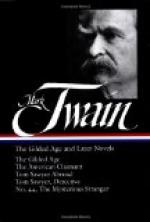It is a matchless morning in rural England. On a fair hill we see a majestic pile, the ivied walls and towers of Cholmondeley Castle, huge relic and witness of the baronial grandeurs of the Middle Ages. This is one of the seats of the Earl of Rossmore, K. G. G. C. B. K. C. M. G., etc., etc., etc., etc., etc., who possesses twenty-two thousand acres of English land, owns a parish in London with two thousand houses on its lease-roll, and struggles comfortably along on an income of two hundred thousand pounds a year. The father and founder of this proud old line was William the Conqueror his very self; the mother of it was not inventoried in history by name, she being merely a random episode and inconsequential, like the tanner’s daughter of Falaise.
In a breakfast room of the castle on this breezy fine morning there are two persons and the cooling remains of a deserted meal. One of these persons is the old lord, tall, erect, square-shouldered, white-haired, stern-browed, a man who shows character in every feature, attitude, and movement, and carries his seventy years as easily as most men carry fifty. The other person is his only son and heir, a dreamy-eyed young fellow, who looks about twenty-six but is nearer thirty. Candor, kindliness, honesty, sincerity, simplicity, modesty—it is easy to see that these are cardinal traits of his character; and so when you have clothed him in the formidable components of his name, you somehow seem to be contemplating a lamb in armor: his name and style being the Honourable Kirkcudbright Llanover Marjorihanks Sellers Viscount-Berkeley, of Cholmondeley Castle, Warwickshire. (Pronounced K’koobry Thlanover Marshbanks Sellers Vycount Barkly, of Chumly Castle, Warrikshr.) He is standing by a great window, in an attitude suggestive of respectful attention to what his father is saying and equally respectful dissent from the positions and arguments offered. The father walks the floor as he talks, and his talk shows that his temper is away up toward summer heat.
“Soft-spirited as you are, Berkeley, I am quite aware that when you have once made up your mind to do a thing which your ideas of honor and justice require you to do, argument and reason are (for the time being,) wasted upon you—yes, and ridicule; persuasion, supplication, and command as well. To my mind—”
“Father, if you will look at it without prejudice, without passion, you must concede that I am not doing a rash thing, a thoughtless, wilful thing, with nothing substantial behind it to justify it. I did not create the American claimant to the earldom of Rossmore; I did not hunt for him, did not find him, did not obtrude him upon your notice. He found himself, he injected himself into our lives—”
“And has made mine a purgatory for ten years with his tiresome letters, his wordy reasonings, his acres of tedious evidence,—”




